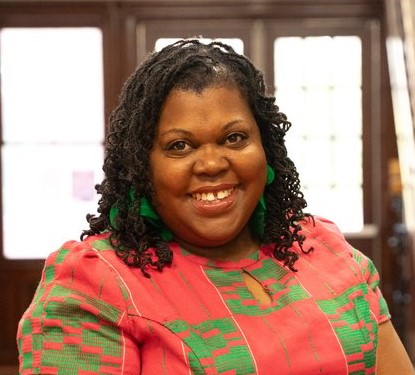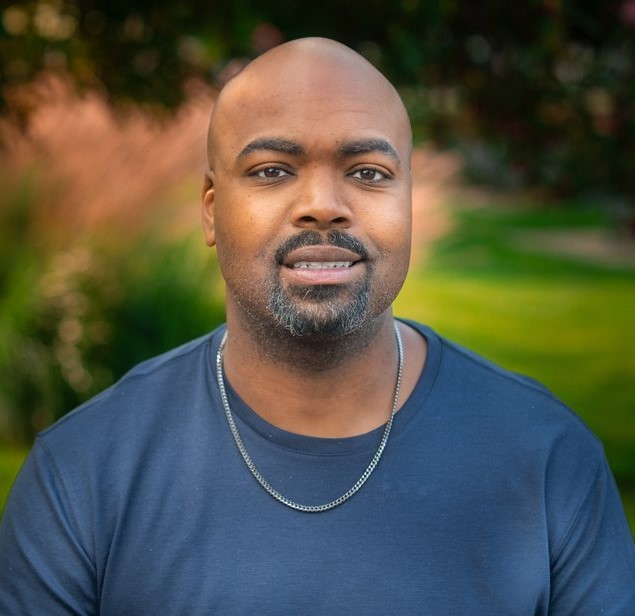Research Fellows
BERC Research Fellows are early to mid-career scholars and researchers who have demonstrated a strong record of scholarship committed to the improvement of educational opportunities and outcomes for Black and other historically disenfranchised students. The BERC Research Fellows Program aims to support and advance the research agendas of scholars generating new knowledge in the subfield of Black education.
Joshua Childs is an assistant professor in the Educational Policy and Planning program in the Department of Educational Leadership and Policy. His research examines the role of inter-organizational networks and cross-sector collaborations to address complex educational issues. He also investigates collaborative approaches involving organizations (local, state, and national) that have the potential to improve academic achievement and opportunities for students in urban and rural schools. This includes ways to improve student engagement and attendance in school, interscholastic athletics, and expanding educational opportunities through concentrated policy design and implementation.
Joshua graduated from Plano West High School, ran track & field and received a B.A. in Elementary Education from the University of Tulsa, earned an M.A. in Education Foundations, Policy, and Practice from University of Colorado-Boulder, and PhD in Learning Sciences and Policy from the University of Pittsburgh.
Selected Publications
Childs, J., & Scanlon, C. L. (2024). Coordinating the mesosystem: An ecological approach to addressing chronic absenteeism. In S. W. Lenhoff, J. Singer, & M. Gottfried (Eds.), Thinking ecologically in educational policy and research (pp. 74–86). Routledge.
Childs, J., Grooms, A., & Mozley, M. P. (2023). Hidden in (virtual) plain sight: A charter district’s focus on attendance during COVID-19. Education and Urban Society, 55(7), 876–893. https://doi.org/10.1177/00131245211065414
Childs, J., & Lofton, R. (2021). Masking attendance: How education policy distracts from the wicked problem(s) of chronic absenteeism. Educational Policy, 35(2), 213–234. https://doi.org/10.1177/0895904820986771
Brandi Hinnant-Crawford, PhD is a self-described motherscholar, critical pragmatist, and liberation theologian. She currently serves as an Associate Professor of Educational Leadership at Clemson University. Crawford’s scholarship focuses on equity and inclusion for marginalized students across the P-20 pipeline as well as how research, particularly improvement science, can be leveraged as methodological tools to catalyze just outcomes. Her work has been published in diverse venues such as Black Liberation Theology, Urban Education, Educational Researcher, the International Journal of Teacher Leadership, and the Interdisciplinary Journal of Problem Based Learning. In her 2020 book, Improvement Science in Education: A Primer, she reconceptualizes improvement by centering equity and justice as the purpose of improvement. She asks scholars and scholar practitioners to consider equity not only as an outcome of improvement but to ensure equity in the process by continuously asking who is involved (who is defining the agenda, who is given decision making authority) and who is impacted (who benefits and who bears the burden of the work).
Brandi holds a doctorate in philosophy from Emory University in Educational Studies, a master’s degree in Urban Education Policy from Brown University, and bachelor’s degrees in English (with teacher licensure) and Communication (media concentration) from North Carolina State University. From the time she first stepped foot in the classroom in the rural south to working in central office in the urban north to conducting research across the county, she has been committed to providing equitable opportunities to learn for all children. Brandi seeks to do the work her God and her soul require, her ancestors approve, and her children deserve.
Selected Publications
Hinnant-Crawford, B., Bonney, E. N., Perry, J. A., Bozack, A. R., Peterson, D. S., Crow, R., & Carlile, S. (2024). Continuous improvement, institutional review boards, and resistance to practitioner scholarship. Educational Researcher, 53(1), 46–53. https://doi.org/10.3102/0013189X231208413
Hinnant-Crawford, B., Bergeron, L., Virtue, E., Cromartie, S., & Harrington, S. (2023). Good teaching, warm and demanding classrooms, and critically conscious students: Measuring student perceptions of asset-based equity pedagogy in the classroom. Equity & Excellence in Education, 56(3), 306–322. https://doi.org/10.1080/10665684.2023.2166446
Hinnant-Crawford, B. N. (2020). Improvement science in education: A primer. Myers Education Press.
DeMarcus A. Jenkins, PhD is an assistant professor in the School of Social Policy and Practice with a secondary appointment in the Annenberg School for Communication at the University of Pennsylvania. His research centers on important policy- and practice-relevant issues concerning Black and other vulnerable populations in relation to education, housing, and criminal/juvenile justice. Specifically, his work focuses on (1) the interconnectedness of education and criminal justice, including the strategies, technologies, and logics of carceral systems that appear in schools; (2) the relationship between education reform and neighborhood development with a focus on housing policies; and (3) the politics of policy change or how marginalized populations interact with the policy process.
He investigates the intersection of race, urban space, and policy and its implications for educational equity and justice. Dr. Jenkins’ interdisciplinary scholarship draws on critical theories of race, critical spatial theory, Black geographies, critical policy studies, and urban sociology. His research has been funded by the Spencer Foundation, William T. Grant Foundation, and the Kresge Foundation.
Selected Publications
Jenkins, D. A. (2023). "Schools are not safer with police”: A critical discourse analysis of public comments on the removal of school resource officers. Journal of Education Human Resources, 41(3), 413–439. https://doi.org/10.3138/jehr-2022-0002
Jenkins, D. A. (2021). Unspoken grammar of place: Anti-Blackness as a spatial imaginary in education. Journal of School Leadership, 31(1–2), 107–126. https://doi.org/10.1177/1052684621992768
Jenkins, D. A. (2020). School reputation as a site of struggle: An investigation of the impact of school choice in Washington, DC on a neighborhood public cchool. The Urban Review, 52(5), 904–923. https://doi.org/10.1007/s11256-020-00562-2
Dr. Kofi LeNiles studies African-centered education and Maroons. His research delves into the positive impact of African-centered education on the socio-academic development of Black children. Additionally, he explores the history and legacy of Maroons, Africans who freed themselves during the Maafa (trans-Atlantic slave trade) and established independent communities in the Western Hemisphere. His work centers on the influence of culture, epistemologies, and life experiences on leadership, teaching, and learning.
Selected Publications
LeNiles, K., & Shockley, K. G. (2023). ReAfricanizing for Black student success: The maroon model. Journal of African American Studies, 27(1), 24–42. https://doi.org/10.1007/s12111-023-09617-6
Burbanks, S. M., Shockley, K. G., & LeNiles, K. (2020). The need for African centered education in STEM programs for Black youth. Journal of African American Males in Education, 11(2), 12–24.
Shockley, K. G., & LeNiles, K. (2018). Meeting the people where they are: The promises and perils of attempting an African centered institution in a public school system. Journal of Pan African Studies, 11(4), 186–204.
Chy McGhee, Ph.D., is an Assistant Professor of Education at The Catholic University of America. Chy's professional experience is rooted in practice as a classroom teacher and instructional coach in K-12 and Adult Basic Education. As an educator, she is inspired by the collective organizing of communities: children, youth, and families, committed to liberation.
The commitment of those who have gone before undergirds her research, which explores the policy enactment of principals in Black and Brown schools, parent organizing, and how urban cities' cultural and political economy and their satellite towns influence schooling. Chy earned her doctorate in Education Leadership from the Department of Administration, Learning, and Technology at the Steinhardt School of Culture, Education, and Human Development at New York University. She has also earned a Master of Arts in Curriculum and Instruction from the Neag School of Education at The University of Connecticut and a Bachelor of Science in Elementary Education from DePaul University.
Selected Publications
McGhee, C., & Haynes, A. (2022). Rebuilding solidarity through advocacy leadership: Principals building coalitions to fight exclusion and displacement in gentrifying communities. Educational Studies, 58(3), 386–403. https://doi.org/10.1080/00131946.2022.2033752
Frehiwot, M., McGhee, C., & Aduako, H. B. (2022). Liberate your mind: Ghana and Kwame Nkrumah’s influence on contemporary Pan-African consciousness in the USA. Journal of African American Studies, 26(2), 125–141. https://doi.org/10.1007/s12111-022-09572-8
McGhee, C., & Anderson, G. (2019). Gentrification, market regimes, and the new entrepreneurial principal: Enacting integration or displacement? Leadership & Policy in Schools, 18(2), 180–194. https://doi.org/10.1080/15700763.2019.1611871
Rhodesia McMillian, Ph.D., is an Assistant Professor of Education Policy at The Ohio State University. Dr. McMillian is an interdisciplinary scholar whose research interests and journal publications examine how federal, state, and local education policies impact school governance and education policy and how educational disparities persist in K-12 public education.
Rhodesia McMillian received her Ph.D. from the University of Missouri-Columbia after consecutive careers as an autism teacher and a school psychologist. Dr. McMillian is the recipient of a Spencer Foundation equity grant that examines constitutional provisions for public education titled A Constitutional Right to Education: A Multi-case Analysis of K–12 Educational Jurisprudence Among the United States Circuit Courts.
Dr. McMillian is also the co-principal investigator of a U.S. Department of Education grant of $5.2 million, a five-year grant focusing on increasing school psychological services for pre-kindergarten to 8th-grade students. She is a member of the Education Law Association, the University Council for Educational Administration (UCEA), and the American Educational Administration (AERA) and has presented research at their annual conferences.
Selected Publications
McMillian, R. (2024). Discursive violence analysis: Epistemological advances in qualitative research. International Review of Qualitative Research, 1–15. https://doi.org/10.1177/19408447241256050
McMillian, R., & Dillion, L. (2024). Systemic nuances of racism: How multi-tier system of supports (MTSS) policy implementation can harm African American students. Journal of Cases in Educational Leadership. https://doi.org/10.1177/15554589241278317
McMillian, R. (2021). Using critical discourse analysis to operationalize discursive violence in school closure education reform policy. International Journal of Qualitative Studies in Education, 1–24. https://doi.org/10.1080/09518398.2022.2112783
Carrie Sampson, Ph.D. is an associate professor in the Division of Educational Leadership and Innovation at Arizona State University. Her scholarship explores how educational leadership and policymaking at the K-12 level influence equity and social justice for minoritized communities. Dr. Sampson’s research is centered at the school district level, emphasizing governance, particularly the role of school boards, community advocacy, decentralization, and school choice policies.
Dr. Sampson has received various awards and recognition for her scholarship, including the National Academy of Education/Spencer Postdoctoral Fellowship, Ford Foundation Postdoctoral Fellowship, American Educational Research Division A (Administration, Organization, and Leadership) Early Career Award, and the UCEA William J. Davis Award for the article entitled “(Im)Possibilities of Latinx school board members’ educational leadership toward equity."
Selected Publications
Sampson, C. (2024). Navigating school board politics: A framework for advancing equity. Harvard Education Press.
Sampson, C., & Bertrand, M. (2022). “This is civil disobedience. I’ll continue.”: The racialization of school board meeting rules. Journal of Education Policy, 37(2), 226–246. https://doi.org/10.1080/02680939.2020.1778795
Sampson, C., & Horsford, S. D. (2017). Putting the public back in public education: Community advocacy and education leadership under the Every Student Succeeds Act. Journal of School Leadership, 27(5), 725–754. https://doi.org/10.1177/105268461702700506
Darrius is a proud father, husband, son, brother and friend to his community. He is also a graduate of the prestigious Florida A&M University, his hometown HBCU. His work centers the political, educational, and philosophical perspectives of Black people to unearth Black genius and possibility in education. He intends to explore and uplift Black people’s communal ways of knowing and existing in education, in hopes of envisioning a path to educational liberation.
His scholarship sits at the intersection(s) of Black education, Black educators, and educational leadership. He leverages historical, community-based, and intersectional qualitative methodologies to better understand the experiences of Black educators in K-12 educational spaces. Further, his work builds on the rich legacy of Black educators as community educators to imagine and conceptualize community-engaged educational leadership praxis.
Selected Publications
Stanley, D. A. (2024). #BlackEducatorsMatter: The experience of Black teachers in an anti-Black world. Harvard Education Press.
Stanley, D. A., & Gilzene, A. (2023). Listening, engaging, advocating and partnering (L.E.A.P): A model for responsible community engagement for educational leaders. Journal of Research on Leadership Education, 18(2), 253–276. https://doi.org/10.1177/19427751221076409
Stanley, D., & Crawford, B. H. (2022). A charge to keep I have: Black women teachers’ spirituality and the implications for educational leadership. Gender & Education, 34(7), 821–837. https://doi.org/10.1080/09540253.2022.2061921







